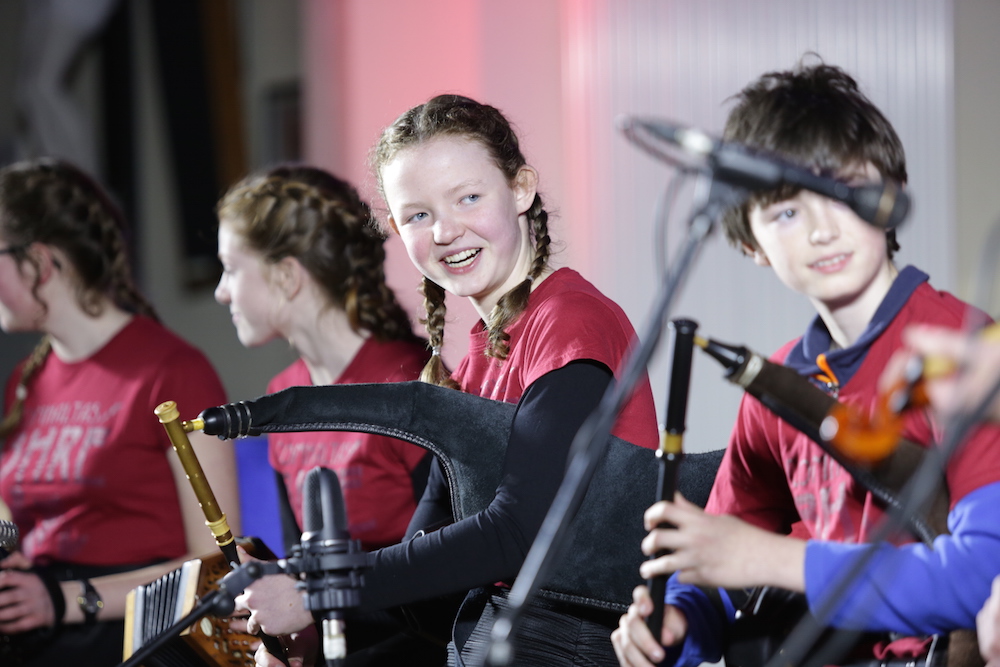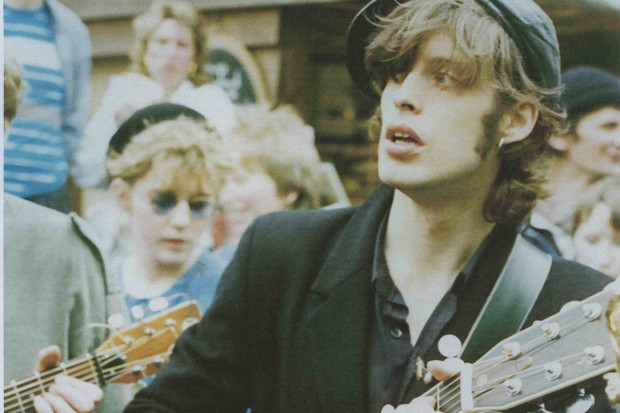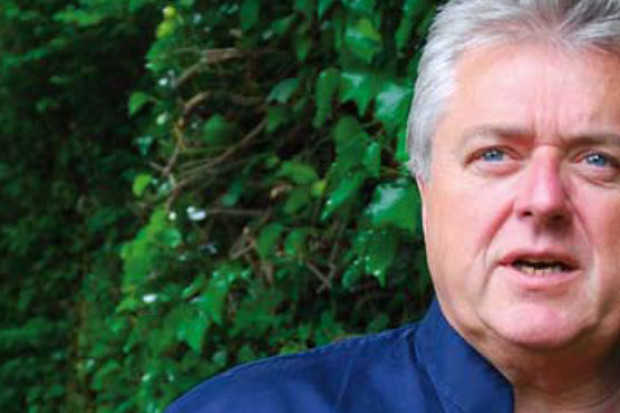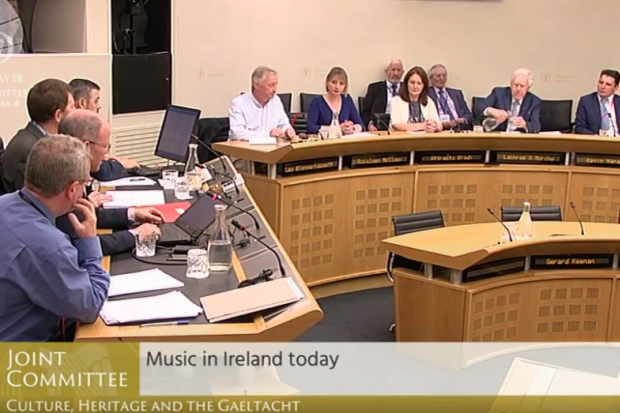
Young Musicians perform at Music @ Mount Leinster 2016, hosted by Music Generation Carlow (Image: Barbara Flynn).
Our Many Possible Selves in Music
What does a ‘possible self in music’ mean? How many of us can relate to encountering a musical experience where a teacher unwittingly or deliberately dismissed our musical tastes, ignored our choice of repertoire, or left us questioning our musical ability? In formal music education, policy and practice has tended to perpetuate myths and ideologies about what music and music education is and whom it is for. A new Music Generation research report aims to counteract these tendencies.
Possible Selves in Music, published this month and written by Dr Patricia Flynn and Dr Thomas Johnston, is a culmination of research conducted by Music Generation and St Patrick’s College, Dublin City University that aims to develop the understanding and thinking required to secure a future direction for instrumental and vocal music education in Ireland. Its overarching objective is to provide opportunities for children and young people to encounter transformative experiences in music through music education. How might such tall aims be achieved? There is a strong theoretical framework within the report that I would now like to unpack.
The ‘worst of all European musical worlds’?
I was born in Dublin in the 70s and started piano lessons at the age of eight with an older lady down the road who used to slap my fingers if I made a mistake. Needless to say that didn’t last, so I gave up at the age of eleven. I then decided to take up guitar (most of my family played it anyway) and this decision changed my life. I met a teacher who was funny, listened to my musical tastes as well as introducing me to new repertoire, and gently nudged me down the pathway to classical guitar. I then went on to study classical guitar at the Royal Irish Academy of Music and pursue a degree in music education at Trinity College Dublin. Such a pathway would not have been possible without these opportunities and a great rapport with my guitar teacher. Interestingly, my musical development coincided with the publication of the Deaf Ears? report by Donald Herron in 1985 which stated the young Irish person ‘had the worst of all European musical worlds’.
But I was lucky. I grew up in the capital city, I had access to instruments and I came from a musical background. Apart from this, having the opportunity to learn an instrument was pivotal to gaining access to music as a subject in school and in higher education. I became capable, confident and musically skilled. A strong relationship with my guitar teacher was also critical to this growth and through a local church choir and with friends, I became socially connected through music. Having access to instrumental music education within my school and community gave me the opportunity to realise my musical, personal and relational self. This story resonates strongly with the ultimate aims of the report Possible Selves in Music. For instrumental/vocal music education to be truly meaningful to children and young people, music-making needs to encompass all three dimensions.
A watershed moment
Previous Irish music education reports are damning of the ad hoc nature of music education provision by the state in addition to the geographic and financial barriers to participation. While this criticism was mostly justified, the undercurrents of a ‘proper’ music education rippled through the discourse. Indeed, it could be argued that Music Education National Debate (MEND), which was the result of meetings convened from 1995 to 1996 aimed at developing a philosophy for music education in Ireland, represented a watershed moment for music education in Ireland. MEND captured the contested ideologies and aspirations among Irish music educators about the state of (formal) music education in Ireland, all the while looking outward to international contexts for comparison.
This was of course during the 1990s. The music industry in Ireland was beginning to thrive. Bands such as U2, The Cranberries and Enya achieved resounding international success and Riverdance took the world by storm. Advocacy efforts in music education seemed futile until philanthropic funding was provided by U2 and The Ireland Funds to establish Music Generation in 2010.
While we may have always perceived the lack of infrastructure that was highlighted in MEND as a travesty, Possible Selves points out the many benefits of coming from a non-systems approach to a new music education infrastructure. Indeed, one of the major findings of the report is:
the benefit there is in having an entirely new approach to establishing an inclusive and accessible performance music education programme in Ireland.
For simply providing access to instrumental music education does not guarantee that it will be inclusive. In the field of music education research, for example, much academic criticism lies at the feet of the undemocratic, mostly white, high-school band system in the US that is deeply ingrained in music policy, teacher education and instrumental provision.
Ecosystem
Unlike such a system, Possible Selves highlights the need to plan and meet the needs of twenty-first century instrumental/vocal music education in Ireland. We live in a diverse society and historically across the western world, music education has tended to perpetuate dominant ideologies associated with the history and practice of western classical music. In terms of the Irish context, it could be possible to fall into the trap of an art/folk dualism, but as this report documents, Music Generation includes many genres and sub-genres within its provision. As the authors write,
Programmes range from hip-hop in Cork City to harp in Laois, to choral composition in Carlow, to traditional song in Louth, to percussion in Mayo; from brass band, to wind band, to bucket band, to big band to rock band, to ukulele orchestra, to young strings… from music-making on a bus, in an arts centre, in a church, in a school, in a local learning hub, in a seaside setting and at a festival.
Possible Selves is a research report and not an evaluation. In many cases, an evaluation will describe how well something is working, whereas a research report explains if, how, and why something works. While evaluations are important for particular projects, their remit tends to be one where existing practice and success is affirmed, often being blind to possibilities for future growth, or dare I say it, change. Within the international landscape of music education, we have seen how evaluations of El Sistema in Venezuela and El Sistema-esque initiatives document very different findings to those revealed by Geoff Baker in his ethnographic research published in his book El Sistema: Orchestrating Venezuela’s Youth. Unlike El Sistema, literally translated as ‘The System’, Possible Selves refutes the notion of one type of system for the Irish context. Rather, it acknowledges that, in order to work authentically within and across diverse contexts, an ecosystem provides a way forward.
Meaningful music making
In the 1970s, developmental psychologist Urie Bronfenbrenner began examining the processes and conditions that influence the course of human development, now widely recognised as his ecological model of human development. Drawing from this theory, the research’s findings are synthesised into a sophisticated ecological model that is at once theoretical and practical. It provides a lens for understanding Music Generation’s philosophy and aims, which are:
- An ecological model of partnership – Music Generation partnerships have developed from the ground up, and are now in 12 areas in Ireland, from Clare to South Dublin. However, more importantly, we see the learner at the core of this ecosystem;
- A spectrum of performance music education – young learners can move through a range of performance opportunities, from engaging with their teacher, to participating in performances, and presenting themselves as musicians or artists;
- Meaningful music making – Children and young people make meaning from their experiences across three dimensions (personal, musical, relational), which I have already alluded to earlier;
- Possible selves in music – children and young people become musically capable, confident, skilled, creative, expressive and innovative, leading to self-confidence, personal growth and becoming socially connected through music.
What is clear from Possible Selves is that Music Generation aims to move beyond simply training future musicians to contributing to the holistic development of children and young people. It resonates strongly with what music education philosophers David Elliott and Marissa Silverman call for in their latest book Music Matters 2. According to Elliott and Silverman, people involved in music education and in music teacher education need to consider the interrelationships between music, education, and personhood. Because music is made with and for people, people are at the core of all musical transactions.
Possible Selves in Music provides a foundation for the future development of performance music education in Ireland. By avoiding a ‘one-size-fits-all approach’, different traditions and approaches are equally acknowledged and valued. While dynamic local partnerships are vital to Music Generation’s future, the State must play a key role in maintaining the foundation and philosophy captured in this report. For it is through positive musical experiences that children and young people can go on to flourish and realise their many possible selves.
A summary of Possible Selves in Music is available below and can also be downloaded here. The full research document is available here.
Published on 22 November 2016
Dr Gwen Moore is Senior Lecturer in Music Education at Mary Immaculate College, University of Limerick and Chair of the Society for Music Education in Ireland.

















